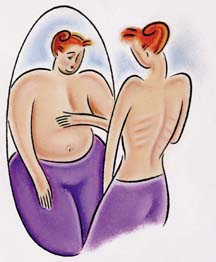Teenagers are very much concerned about their weight and shape.
 At the period of puberty, kids bodies change dramatically and they will face new social pressures like attracting towards apposite sex.
At the period of puberty, kids bodies change dramatically and they will face new social pressures like attracting towards apposite sex.
Up to 10 million teenagers in the United States have eating disorders and have abnormal attitude and behaviors toward foods.
Usually eating disorders begin at the age of 11-13 years old. Both girls and boys can experience eating disorders.
Parents need to play a role in order to prevent eating disorders in your child.
Eating disorder can disturb child’s body’s normal functions and everyday activities.
Anorexia – An eating disorder
In this type of eating disorder people starve themselves and stay away from eating. It is life-threatening illness affecting more and more young women. Usually this condition begins in young adolescents and they have extreme weight loss.
Most of the people with anorexia think that they are overweight even after they become extremely thin. Due to this, they will develop very strange eating habits like refusing foods in front of others.
Do you know that anorexia can be a genetic disorder! This eating disorder can also be considered as genetic brain disorder which shares its characteristics with autism and Asperger’s syndrome. Some of you can share traits with people who suffered from autism. This is a condition in which people often communicate, interact and perform repetitive behaviors.
According to studies, people with eating disorder had difficulty in changing self-set rules and learn behavior once they fix it in their brain. They closely watch the world and think about self-identity and connections with others without getting lost. This can also be referred as the female form of Asperger’s syndrome.
Bulimia nervosa – An eating disorder
Bulimia nervosa means eating excessive amount of food in short period of time. Overeating is followed by an attempt to compensate by purging, which can associate with vomiting, laxative, diuretics or excessive exercise.
Usually, this condition can cause between the age of 16 or 17. In both of the above mentioned eating disorders, the chances of getting them are higher in women.
Effects of eating disorder on your health:
You will get more obsessive, more anxious, and your cognitive function often gets a little. Your body starts to shut down, your brain shrinks and your body stops developing the bone mass. This condition can lead to osteoporosis in your later life.
Once you become thinner, you will often get cold like symptoms and there is large growth in your body hair. Individuals who are having psychic risks or some other issues like depression or anxiety are at an increased risk for eating disorder. Also, people with trauma such as abuse or rape are at higher risk.
Eating disorder affects all aspects of your life like, relationships, works, your physical health and also your emotional health.
Eating disorder verses diabetes:
Diabetes and eating disorder are both linked with each other. They both involve paying attention to body states, weight management, and control of foods. The complications associated with both these conditions can be very serious.
Both the conditions together can cause amputation of limbs, blindness, impaired circulation, kidney disease, and nerve death.
In order to get better control over your body, pay close attention to body’s structure and state, proper weight management, quantity and the type of food consumed, timings of the food and content of meals.
People with diabetes feel guilty, anxious and out of control if they experience any fluctuations in their blood sugar levels. In the same way, people with eating disorder can feel if there are any weight fluctuations.
People who have both the problems can be confused with the approaches to control their weight and blood sugar.
Eating disorder in children:
In today’s society most of the children under the age of 12 are developing with eating disorder. Children grown in a dysfunctional family are at a higher risk of developing this disorder. If there is any physical or sexual abuse, the child can develop an eating disorder to get a sense of control.
In order to deal with the emotions, a child can also develop eating disorder, especially if the child is grown in a home that doesn’t allow expressing the feelings. This makes the child to become an emotional eater. If you involve completely in your child’s tasks, he/she can turn to food for comfort.
As a parent if you are overweight, it causes to develop a condition of eating too much in your child. If you follow proper diet plans and express dislikes towards certain foods, it helps to develop the same habits in your child.
Preventing eating disorder:
Individuals who are having eating disorder needs to be treated by a treatment team, not just by an individual. In order to treat anorexia nervosa, the most important thing to get is weight restoration and then conducting psychotherapy.
To treat bulimia, there is no need for weight restoration. The thing you need to do is stop overeating. You tend to binge eat and then purge. Treatment of bulimics includes psychotherapy, nutritional rehabilitation and establishing good eating patterns. Antidepressants like serotonin reuptake inhibitors can be used if psychotherapy does not work.
Eating together can prevent eating disorder: As a parent, you need to take responsibility to control eating disorder in your child. Girls who ate family meals are at the lower risk of developing eating disorder. There are four benefits of eating together. They include:
- Generally family meal food is healthier
- Your children will get good eating habits
- You can develop regular connection with your kids
- You can have the chance to monitor food behavior
Eating together can give healthy eating habits in your child. They don’t follow unhealthy weight control behaviors. Simply they are about half the risk of developing these behaviors.














